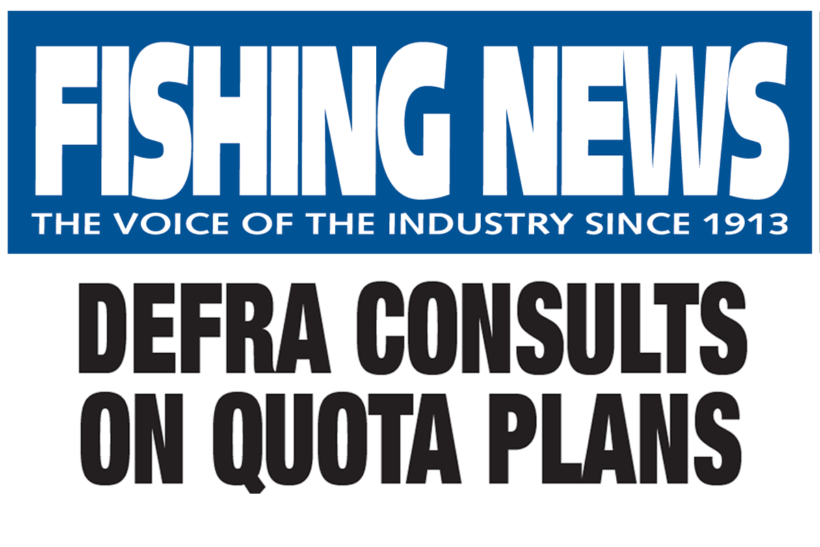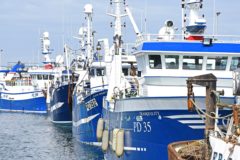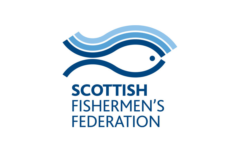DEFRA consults on post-Brexit plans in England
Changes to economic link and additional quota shareout
DEFRA has begun a wide-ranging consultation with the English industry on proposals on three issues that will be of central importance in establishing the post-Brexit fisheries management regime, reports Tim Oliver.
In three separate but linked consultations, the government is seeking views on:
- A strengthened ‘economic link’ for English-licensed vessels to help ensure genuine economic benefits for coastal communities – including plans for an increased landing requirement of 70%
- Proposals on how new opportunities that the UK secures in negotiations with other countries will be split between Scotland, Wales, Northern Ireland and England, in a way that is fairer and more profitable for fishing communities across the four nations
- Further proposals on how England’s share of those new opportunities would be distributed across the English fleet to benefit coastal communities and fishermen and women.
Fisheries minister Victoria Prentis said: “As we take back control of our fisheries, we are creating new powers to set fairer fishing opportunities for industry and coastal communities through our flagship fisheries bill.
“We want your help to design a more profitable fishing industry. This includes ensuring that more fish are landed in UK ports, providing a boost to the whole supply chain, from auction houses to fish processors.”
The strengthened ‘economic link’ proposals put forward for consultation would see English licensed vessels land 70% of their catch in the UK – up from the current 50%. The plans would allow vessel owners to use a combination of the two criteria – landings and quota donation – to meet the economic link requirement, recognising the importance of flexibility to support ongoing business practices.
DEFRA said: “As the UK continues to negotiate with the EU and other coastal states, the UK government is seeking views on how new opportunities secured through these negotiations should be distributed, both across the UK and within England, in order to deliver maximum benefits to our fleets and coastal communities.”
The consultation also applies to the Crown Dependencies (the Channel Isles and the Isle of Man). The three consultations are open for four weeks, until 10 November.
Economic link
Economic link conditions – which are a devolved matter – apply to all UK-registered over-10m vessels that fish against UK quota, and require them to demonstrate a link, or benefit, to the UK’s economy.
Currently, vessel owners must demonstrate a link by doing one of the following:
- Landing at least 50% of catch into the UK
- Employing a crew of whom at least 50% live in the UK
- Making normal operating expenditure into UK coastal areas
- Donating quota for use by the inshore fleet.
Most vessels meet the economic link condition by landing at least 50% of their quota catch in the UK.
DEFRA’s proposals would increase the landing requirement to 70% for quota species, and increase the quota donation requirement. They allow vessel owners to use a combination of the landings and quota donation criteria. The crewing and financial expenditure criteria will be removed as these generate lower economic benefits.
The new economic link requirements for England are expected to come into effect from 2022.
More information on economic link proposals is available at: bit.ly/2GP92iZ
Quota allocation and management
DEFRA expects the UK to have more quota in 2021 after Brexit, but will not know precise stocks and tonnages until negotiations conclude later this year.
It wants to ‘explore alternative methods for allocating and managing quota’, but will ‘move carefully and avoid radical reforms which could lead to unintended consequences and potentially be destabilising for industry’. The process will be refined over time. “This means that how we allocate and manage quota in 2021 may differ from that in future years,” says DEFRA. The proposals also cover the future of the English quota reserve and future English quota management trials.
A consultation in 2019 showed no consensus about how additional quota should be used.
The new consultation sets out five proposed aims of quota management:
- Fair distribution of fishing opportunities
- Maximising long-term economic investment and return
- Incentivising good behaviours and innovation
- Transparent and objective allocation, trading and management of quota
- Simplifying the system, with decisions made closer to those affected.
However, despite proposals for changes in the way additional quota is allocated, DEFRA says that investments in quota (FQAs) should be respected, and that ‘we will continue to allocate our existing share of quota using the current system’.
It recognises that there is an imbalance between quota held by the POs and non-sector/under-10s, and that leaving the EU gives ‘an opportunity to do something different and address this imbalance’.
DEFRA also wants to see quota managed so it is all used, which means being flexible, it says.
Pilot schemes
Community quotas
DEFRA also plans to pilot community quota and effort control schemes.
“We would like to see fishermen creating their own community groups and working with the MMO and us to develop the specific arrangements for each pilot scheme,” it says.
Each scheme would be provided with quota management responsibilities to give fishermen flexibility to manage quota to benefit their communities.
Effort control
There is industry interest in effort control, but also concerns, says DEFRA. Benefits include the ability to land all catches, no wasteful discarding, and simplicity and flexibility for fishermen.
Concerns includes a potential ‘race to fish’ for valuable species, crew safety, and whether effort can be managed sustainably within overall UK quota management.
Any effort pilot must be ‘robust’ and be fully evaluated, says DEFRA. Fishermen should be involved in the design of pilot schemes and play a key role in making decisions.
More information on the quota management proposals is available at: bit.ly/3iWpElS
Allocating quota between administrations
The current method for apportioning quota between administrations is predominantly based on FQAs, and there are no plans to change this, says DEFRA. The aim is to learn from the current method to inform how additional quota obtained after Brexit should be shared.
Considerations will include the needs and track record of the existing fleet, as well as potential opportunities for industry to develop elsewhere.
Options under consideration for criteria for allocating quotas between the administrations include:
- Geographic location of the stocks, based on zonal attachment
- Historic uptake, taking account of previous landings by vessels registered in each administration
- Capacity of the fleet in each administration, based on the number of vessels in each administration or gross tonnage or gross engine power of the vessels
- Sharing quota according to the policy priorities of each administration
- A hybrid approach that would take the best elements of each of the other options while finding ways to deal with their disadvantages. This could be complex.
There is more information on allocating quotas between administrations at: bit.ly/3iWpElS
A summary of responses to the consultations will be published at: gov.uk/defra before the start of the 2021 fishing year.






